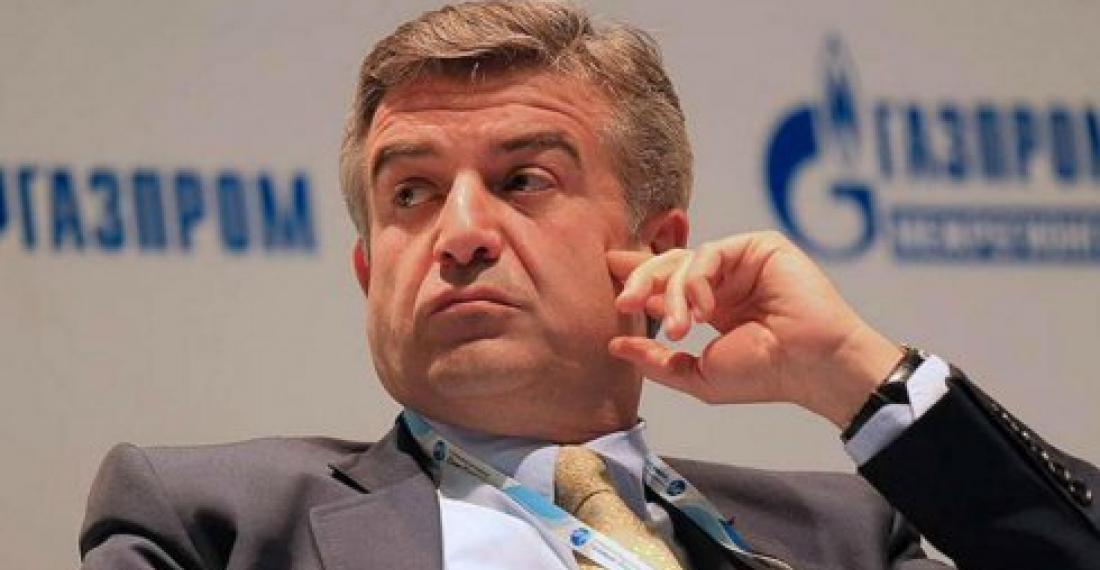This is a commentary by the political editor of commonspace.eu
Armenia's new Prime Minister, Karen Karapetyan, yesterday went to the National Assembly for his first meeting with the members of the Armenian Parliament. Karapetyan was appointed Prime Minister by President Serzh Sargsyan on Tuesday, after being proposed by the political council of the ruling Republican Party.
Karapetyan was born in Nagorno-Karabakh in 1963. He is the 14th Prime Minister of independent Armenia. He studied applied mathematics at Yerevan State University. He has spent most of his career working in the energy sector, often with companies related to the Russian energy giant Gazprom. His only experience of politics was as a city councillor, and for a short time from 2010-11, as Mayor of Armenia's capital, Yerevan. Many Armenians see Karpetyan as Russia's man - the one sent from the north. His Karabakh roots link him to Sargsyan and the Stepanakert elite that dominate current Armenian politics. These two factors can be complimentary and mutually re-enforcing, but this will not necessarily be the case in the future if Russia decided to pursue a less Armenia friendly policy in the Karabakh context.
Karapetyan takes over as Prime Minister at a challenging time for the country. Economically Armenia has been badly affected by the global economic downturn, especially its impact on Russia. Armenia has joined the Eurasian Economic Union, although there are mixed views as to the extent this has so far helped the Armenian economy. On top of this Armenia has some serious political challenges ahead. The crisis around Erebuni Police Station in July exposed serious shortcomings in the political system. People overall, and across the political spectrum, are crying out for change and reforms. President Serzh Sargsyan, a cautious man by nature, promised to deliver change when he addressed the Armenian elite at the end of the Erebuni crisis. The appointment of Karapetyan is the best indication of what is to come.
Karapetyan is known to be a good manager. Is he however a reformer, and is he a leader who could deliver the much needed change Armenians seek? Time will tell, although some Armenian commentators are quite sceptical. The first indication of what kind of government he will lead will come over the next days when he appoints his new Ministers. He promised professionalism as a leading criteria. Yet more good managers, without the instinct to make changes where necessary, will simply give the system a short respite, rather than address the crucial problems.
Perhaps by co-incidence, perhaps by design, the appointment of Karapetyan coincided with a political agreement between Armenian political forces on electoral reforms that are designed to secure a better election system in time for next year's all important parliamentary elections. Under recently adopted constitutional changes Armenia will from that point onwards be essentially a Parliamentary republic. Many see Karpetyan as a transitionary figure, clearing the decks and implementing some popular changes that would enable the ruling republican Party to secure another election victory. At that point most Armenians seem to think that President Serzh Sargsyan will seek to retake the premiership back to himself.
Personalities matter, and in the Caucasus they matter a lot. However at this point in Armenia's history policies are more important. Karpetyan should quickly outline his priorities and policies which must include a clearly articulated action plan for change and reform - and how the many good ideas that Armenia has already adopted on paper, can be translated into concrete action for the benefit of the Armenian people.
source: This commentary was prepared by the political editor of commonspace.eu
photo: Armenia's new Prime Minister Karen Karapetyan (picture courtesy of civil.net







